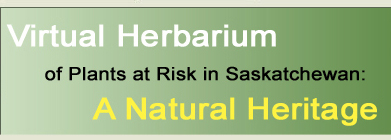
|

|

|

|

|

|

|
|
|
|
|
|
| Myosurus apetalus var. montanus (Campbell) Whitemore | Species Image Gallery (opens in a new window) |
||||||||||||||||
| TAXONOMY | |||||||||||||||||
| Family: | Ranunculaceae | ||||||||||||||||
| Genus: | Myosurus | ||||||||||||||||
| Species Synonyms: | Myosurus aristatus ssp. montanus
(Campbell) D.E. Stone ex Mason Myosurus minimus ssp. montanus Campbell |
||||||||||||||||
| Common Names: | tiny mousetail mountain mousetail awned mousetail |
||||||||||||||||
| DISTRIBUTION | |||||||||||||||||
| Canada: | southern British Columbia – southern Alberta – southern Saskatchewan – southern Manitoba – southern Ontario | ||||||||||||||||
| Saskatchewan: | southern Saskatchewan; Cypress Hills – Rockglen – Saskatoon | ||||||||||||||||
| Ecoregion: | Cypress Upland, Mixed Grassland, Moist Mixed Grassland | ||||||||||||||||
| HABITAT | |||||||||||||||||
| Saskatchewan: | slough margins, mudflats, and prairie and cultivated field depressions | ||||||||||||||||
| Associated species: | Chenopodium glaucum, Iva axillaris, Juncus bufonius, Veronica peregrina | ||||||||||||||||
| RARITY STATUS | |||||||||||||||||
| Provincial
Status According to Harms (2003): |
Vulnerable |
||||||||||||||||
| Nature Conservancy Status: | G5 |
||||||||||||||||
| Saskatchewan
Species at Risk Status: |
None |
||||||||||||||||
| COSEWIC Status: | None |
||||||||||||||||
| Myosurus apetalus var. montanus is vulnerable but is apparently secure in Saskatchewan. It is only somewhat regionally restricted in the province. No immediate threats are known but may occur in the future. | |||||||||||||||||
| SPECIES DESCRIPTION | |||||||||||||||||
| Height: | 1.5 – 12 cm | ||||||||||||||||
| Roots: | fibrous | ||||||||||||||||
| Stems: | annual, scapose | ||||||||||||||||
| Leaves: | basal, blades 1 – 8 cm long, linear to narrowly oblanceolate, margin entire | ||||||||||||||||
| Inflorescence: | flowers solitary; developing into heads in fruit (apocarpous ovary), heads elongated, 11 – 25 mm long, 1.5 – 2 mm wide, appearing roughened due to projecting achene beaks, extending beyond leaves | ||||||||||||||||
| Flowers: | sepals 5, faintly 3-veined, margin scarious, usually spurred at the base; petals 5 or fewer, 1 – 3 mm long, claw 1 – 2 times as long as blade, white; stamens 5 – 10; carpels many on a receptacle | ||||||||||||||||
| Fruits: | one-seeded, 1 – 2 mm long, beak diverging from outer face of fruit | ||||||||||||||||
| |||||||||||||||||